Man trades day job to tend pigsties…says every family can run a business
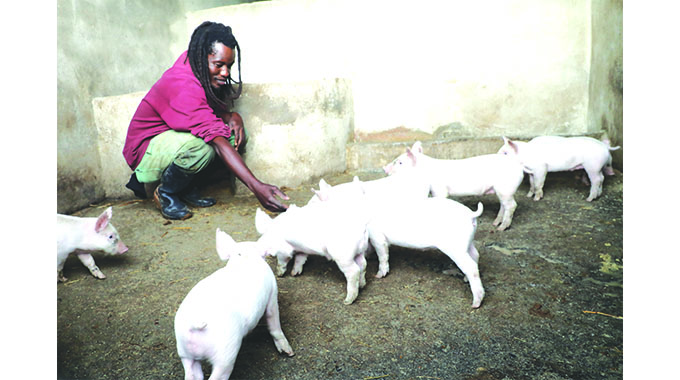
Bongani Ndlovu, Chronicle Reporter
FOR Mr Clive Change, the decision was simple. Toil for the rest of his life, struggling to make ends meet as a salesperson or take up farming at the family plot and continue the legacy that his parents started years ago.
Any man in his life comes to a crossroad, where he has to make a decision for himself, his future and the future of his children.
That decision for Mr Change came full circle in June 2021.
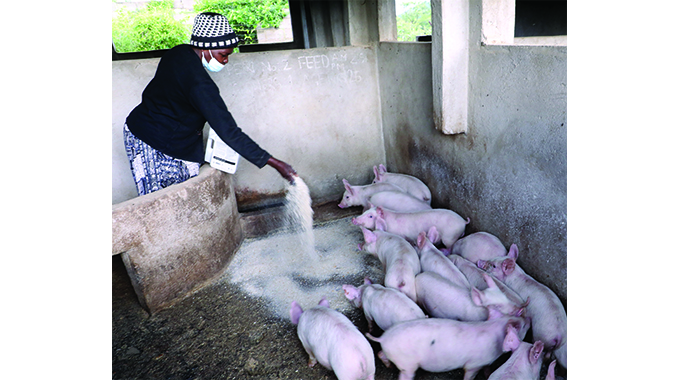
For years, his parents had been working on the family Edjoy Farm in Claremont, Esigodini in Matabeleland South, rearing chickens mostly.
A father of two and the husband of Simangele, Mr Change saw that he had more of an opportunity of earning a decent income than working selling televisions, radios, sofas and beds at a local store in the Bulawayo city centre.
After years of rearing chickens at their farm there was a lull in sales and the money that had been saved from the chicken sales, his parents Mrs Ednah and Mr Felix Change decided to change tact and start rearing pigs.
A visit to their farm this week, the dreadlocked Mr Change in his overalls, welcomed the news crew with a smile as he ushered them to the pigsty, where 140 of the animals are housed.
An overwhelming “aroma” of a mixture of pig faeces, stock feed and water invade your nostrils and it gets even stronger as one closes in on the pigsties, where the distinct oinks of piglets and grunts of adult pigs grow louder.
Being at the back of the property and downwind of it, might be the reason that it is located there.
The pigs are at various stages of growth and also are of different uses in this plot that they want to turn into an ecosystem.
There are a number of sows which are breeders that have at least 11 piglets in their litter and boars that are used to breed, weaners that are being prepped for the market and those which are ready for slaughter.

A pig carcass that they rear is between 50 and 60kg when slaughtered and they sell it at around US$3,75 per kg.
In music circles, Mr Change is known as Wa-BB a Nambya musician, who said after 11 years of being formally employed he decided to quit his job and concentrate on the projects at the plot.
“Projects at the plot were overwhelming and I needed to be on the ground to make sure things moved. At the plot you are on duty 24/7 running around sourcing feed, taking pigs to the abattoir, delivering to customers and any other duties.
All this was being handled by my parents and my sibling Joanna. Truly speaking as the project grew it was too much for them, there was a need for me to take up the ropes and be the main man.
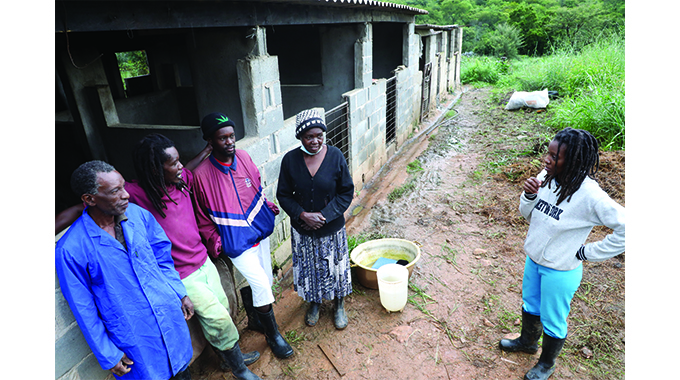
Edjoy Farm family members (from left) father Felix Change, son Clive and his son, mum Ednah and daughter Joana
“At work my employer also needed me 24/7. At home they were sceptical, hoping that the project would grow big enough financially, so that I quit my job. So, it was a decision I made without the blessings of anyone from home.”
Despite this, Mr Change said he had a vision to provide for his family.
“It was a risk because the farm can’t pay me what I forewent with my employer, but I saw the bigger picture, the vision.
It is to build a legacy for the family, being a major player in the food industry beyond national and regional borders. And to build all that one has to be on the ground, literally,” said Mr Change.
“Strategic planning to help us sustain our business with all the instability in our economy, decisions need to be made on a daily basis and you can’t make decisions when you are at work and not seeing what’s on the ground.”
Mr Change took the crew around the farm’s pigsties saying they started off with only two sows in 2018.
“We started off with two sows and you realise that it’s not enough for you to invest in a boar. Because the boar will be idle for most of the time.
We acquired more until we had six then that’s when we bought a boar. Thereafter it was at least busy for a couple of months,” said Mr Change.

“So, what we do is that we have two sows that are serviced per month so that they give birth at different intervals during the year.
This is because we want to have a constant supply to the market, rather than doing it in stops and starts. Now we have 14 sows and every month there are at least three that are giving birth.
We can sell 20 pigs a month and the profit is determined by the market price and meat is a luxury.”
Education in the pig industry was very important as his father Felix, attended a three-week course at the Pig Industry Board in 2018.
“When he did the course, he then imparted that knowledge to us on how to rear pigs and I am due to do the same course. You get to see everything, how pigs give birth, how to take care of them, what and how to feed them, vaccinations they need, cleaning the sty and so on,” said Mr Change.
He said every family has the human resources and if they want to run a business, they can do so easily.
“My father is an electrical engineer by profession, so all technical stuff at the farm is done by him. My mother is an accountant by profession, (CIS) and holds a Master’s in Business Administration and is the driving force in strategy and investment.
I hold a BBA Degree in Marketing Communications (IMM) and I do the run-around selling and finding the market.
Joanna has BSC Honours in Biology and Biochemistry, everything to do with nutrients of the pigs and vaccines she is in charge,” said Mr Change.
He said as a way of value addition, they are planning to open a small butchery so that they can sell to the market on their own.
“When we get that we can get into making our own sausages, mince, curing our own bacon, ham and polony,” said Mr Change.
“This is part of the growth of the business in the coming years. What I’m targeting is to have 24 sows at this farm, and expand the pigsties.
This will need more people to work for us, rather than the family doing it.”
Mr Change said they now supply major butcheries in Bulawayo such as Heads and Hooves and believes that quality feed begets quality meat.
“We took the pigs to the abattoir and they were happy with our meat. This happens not because we feed the pigs cabbages and rotting bread, but we are very specific in our feeds.
This is where my sister Joanna comes in, as she is a biologist by profession and she knows the nutrients and the vaccines that are needed for the pigs,” said Mr Change.
However, the pigs (fed twice a day) at his plot, Mr Change said devour a tonne of stockfeed per month, a cost they are trying to cut down.
“We bought a grinding mill and we want to mix our own feed for the pigs. This is because our pigs eat around a tonne of stockfeed and this stockfeed is expensive at US$28 to US$30 per 50kg bag.

At the plot we have planted maize so that we get some of the grain, get pre-mix and soya then mix our own feed. This will reduce each 50kg bag cost to around US$18 or US$19,” said Mr Change.
“The tricky part is that you need to give them a certain type of food. The breeders and the boars, they eat once a day, the sows with piglets they eat twice a day.
Each has to eat 2,5kg of food a day and how do you quantify this with cabbages and rotting bread?”
In the future Mr Change wants to expand into goat rearing and bring back broiler chickens that kick-started the pig husbandry that is making money for the family.
– Follow on Twitter @bonganinkunzi

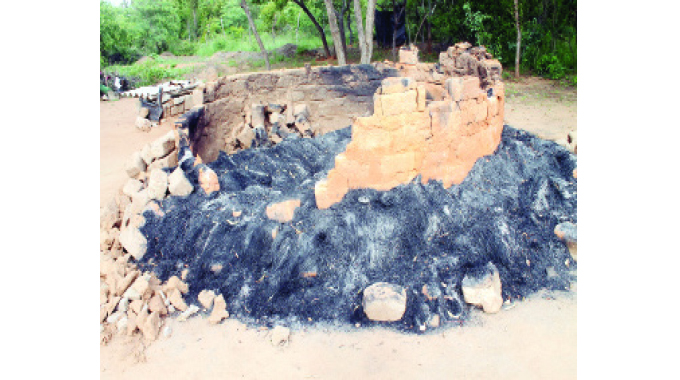
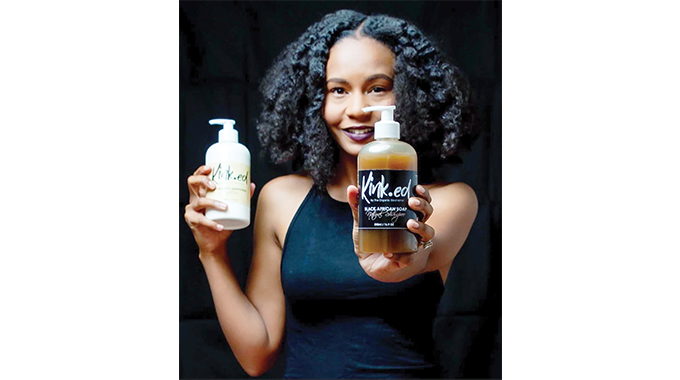









Comments